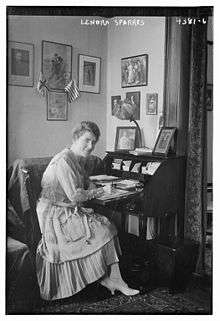Leonora Sparkes

Lenora Beatrice Sparkes (1879 - June 8 1969) was a British-American mezzo-soprano who performed at the Metropolitan Opera in New York City in the 1910s.[1][2]
Biography
She was born in 1879 in Gloucestershire, England to Jacob Sparkes and Elizabeth Mountain. Andreas Dippel heard her sing at Covent Garden and offered her a contract at the Metropolitan Opera in 1908.[3]
She appeared in the American premiere of Boris Godunov at the Metropolitan Opera as Tsarevna Xenia Borisovna of Russia on March 19, 1913 with Arturo Toscanini conducting.[4]
She sang with Enrico Caruso three times, including in the MET's production of Aida in 1913. Her career was primarily spent in London and New York, but she also sang in Paris.
She died in Erie, Pennsylvania aged 90.[2]
References
- ↑ "Leonora Sparkes's Recital". New York Times. January 16, 1920. Retrieved 2011-03-09.
Miss Leonora Sparkes, whose name appears often on the bills of the Metropolitan Opera House, and seldom on the program of song recitals, gave a recital yesterday afternoon in Aeolian Hall that had many features of interest, and gave ...
- 1 2 "Obituary". Opera. October 1969. p. 60.
- ↑ Henry Charles Lahee (1912). The grand opera singers of to-day: an account of the leading operatic stars.
Leonora Sparkes was a well known concert and opera singer in England. Dippel heard her at Covent Garden and after a private hearing offered her a contract at the Metropolitan Opera-House in 1908. She has been a member of the company ever since.
- ↑ "American Premiere of 'Boris Godounoff' Wednesday". New York Times. March 12, 1913. Retrieved 2011-03-09.
Boris Godounoff, the Russian opera by Moussorgsky, will be the feature of next week's repertoire at the Metropolitan Opera House, where it will have its first American hearing on Wednesday evening. It will be conducted by Mr. Toscanini, and the cast will include Madames Homer, Case, Sparkes, Maubourg, and Duchene, and Messrs. Didur, Althouse, Rothier, Reiss, Bada, De Segurola, Rossi, Audisi, Reschiglian, and Kreidler.